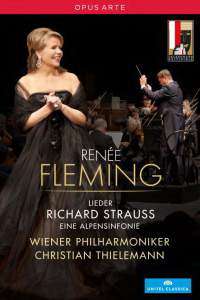|
Back
08/31/2012
Richard Strauss: Befreit, Op.39 No.4 – Winterliebe, Op.48 No. 5 – Traum durch die Dämmerung, Op.29 No.1 – Gesang der Apollopriesterin, Op.33 No.2 – “Mein Elemer!” from Arabella, Op. 79 – Eine Alpensinfonie, Op. 64
Renée Fleming (soprano), Wiener Philharmoniker, Christian Thielemann (conductor)
Recorded at the Grosses Festspielhaus, Salzburg, Austria (August 7–8, 2011) – 84’
Opus Arte OA BD7101D – Picture format: 16:9 1080i – Sound format: LPCM 2.0, dts-HD Master Audio – All regions – Subtitles in English, French, German and Spanish – Blu-ray Disc and booklet with essays in English, French and German

   
The music of Richard Strauss has been very good to Renée Fleming. Consequently, Ms. Fleming has been very good to it. The songs and operas of Strauss have occupied a nearly career-long place in her repertoire, singing the well-known songs and operas, but also championing the lesser-known pieces such as Daphne. Backed by the esteemed Christian Thielemann and the Wiener Philharmoniker, the prospect of a concert at the Salzburg Festival would be an enticing event indeed. This Blu-ray release finds all in splendid form with the standout being the Philharmoniker’s fresh performance of Strauss’ captivating Alpensinfonie.
The Lieder in this recital are not what one would consider Strauss’ “greatest hits.” There’s no Four Last Songs or Cäcilie. In a way, it is a relief to get a glimpse at some lesser-known pieces and, for the most part, Ms. Fleming does a fine job of making these pieces relevant. In some ways, it is remarkable how unblemished Ms. Fleming’s voice still is. We have been spoiled by her luscious voice and committed artistry for well over two decades now. In this concert, her ability to spin a phrase and control a line is still virtually unparalleled. For the most part, the songs in this program amply play to her strengths. The wistful Befreit and irresistibly charming Traum durch die Dämmerung showcase the fine balance Ms. Fleming brings to song recital: assurance of technique with a text-driven pathos. Her soaring lines and blazing high-notes are the vehicles through which she accomplishes this so effectively and makes these pieces all the more seductive. Unfortunately, the lightning-fast Winterliebe seemed to be a slightly ill fit with the pattering notes and texts blazing past before Ms. Fleming was able to give them much substance of sound. Still, the Gesang der Apollopriesterin was maybe the highlight of the Lieder selections. Occasionally, Ms. Fleming would seem a little under-powered in her lower-mid voice, but the upper-mid was astonishingly powerful and lush. The song’s noble conclusion was inspiring, backed up by the fervent playing of the Wiener Philharmoniker.
The concluding scene from the first act of Arabella seemed to find Ms. Fleming in a different place, dramatically. Her seeming familiarity with and affinity for this piece brought it a bit closer to the audience. Her dramatic deportation was a welcome break from her more-formal recital stature of the previous selections. Tossing off phrases with abandon, Ms. Fleming played the heroine with infectious enthusiasm. It was a highly enjoyable closing selection with Mr. Thielemann and the Wiener Philharmoniker bringing the raucous waltz to a head.
The second half of the concert featured Strauss’ majestic Alpensinfonie. Maestro Thielemann and the Wiener Philharmoniker, who recorded this piece together over 10 years ago, have made the tone poems of Strauss a speciality. Considering that, this performance is remarkably fresh with a touching sense of “occasion.” At times, it can seem a bit more like an Alpine dash than an Alpine journey, as the Maestro keeps a brisk pace for the most part. But that is certainly part of what makes this so effective a performance. The undulating surge to “Sunrise” is determined, resulting in an effusive apex. The burnished strings seem to be pulled rather than urged by a determined Maestro Thielemann through the “Ascent.” At times the Maestro’s boyish good looks make him appear as the impatient lad leading the journey. It is a highly effective approach that gives the piece a youthful enthusiasm and makes contrasting moments such as the “Wandering by the Brook” more spacious and nostalgic. The orchestra play with breathtaking sensitivity here and the details are clearly heard to great effect. The oboe solo “On the Summit” is another such fantastic moment of tenderness. The Wiener Philharmoniker play throughout with their characteristic sound seeming an ideal fit for this piece. To their credit, their deep, pulsing strings manage to play precisely and not get bogged down in their own sound. The brass occasionally loose focus of tone at the most bombastic moments, but without detriment to the score. Mr. Thielemann takes care not to let the concluding moments in the epilogue get lost. He keeps an intense hand giving the music a fresh and caring conclusion.
The sound is bright and sparkling throughout and the details in the more intimate moments of the Alpensinfonie jump right out at the listener. Some listeners may find the sound captured too closely, but it is not disturbingly so. The camera and directorial work is outstanding at capturing important instruments, bringing the details to the listener. Fans of Ms. Fleming will certainly be interested in this release and should find the results worth their time. Fans of Strauss, and the Alpensinfonie in particular, will not be disappointed in this account and may indeed find some new details to enjoy.
Matthew Richard Martinez
|